|
|
| |
 |
| |
|
|
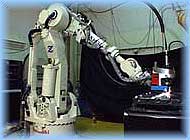 |
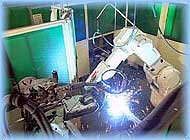 |
| By
sending power over optical fiber, YAG laser welding
enables the flexible welding and cutting of workpieces
in a wide variety of forms. In particular, automobile
bodies can be welded together utilizing the benefits
of line junctions, i.e., greater strength and rigidity
of the junctions and thinner plates. |
|
| This
is a jig-less arc welding system that uses
two robots in combination to weld huge workpieces.
In automobile manufacture lines, it can be used
to perform the final welding of brackets temporarily
welded to rear axles. |
|
|
|
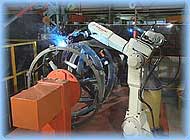 |
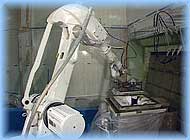 |
| These
robots allow the automated arc welding of auger
housings, which are extremely large workpieces.
They weld and reinforce the wings and cutting rings
in the manufacture of ribbon-screw augers, which
form the central parts of snowplows. |
|
| After
the reflectors of automobile headlamps are processed
with metal plating, they are sprayed with ultraviolet
curing paint using an HVLP air spray gun. When the
workpiece is set at the end of one of the shuttles
and the button is pressed, the shuttle moves to
the painting position. While painting is in progress,
another workpiece for painting is set at the other
shuttle. When the painting program is terminated,
the next workpiece moves to the painting stage automatically
with no time lack. |
|
|
|
|
| BL-Autotec
products are No. 1 robotic accessories in Japan. The Accessories
for robotic applications ranging from Quick change tools,
RCC Compliances, Centering & Locking device for end
effectors, Rotary joints with pneumatic & electrical
supply, Robotic Deburring tools with compliance, overload
protection safety joints. |
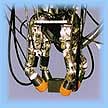 |
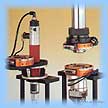 |
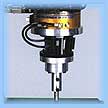 |
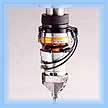 |
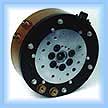 |
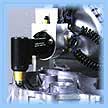 |
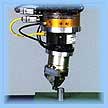 |
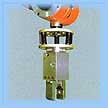 |
|
|
|
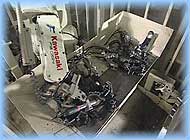 |
 |
| This
is a deburring system that, in order to utilize
space efficiently, uses Kawasaki's compact FS06.
The FS06 uses an electric tool to eliminate the
casting burrs on intricate knuckle steering units,
which are held by a jig, from above, diagonally,
or in any other direction. |
|
| This
system uses an endless belt grinder and a reciprocal
file called "super hand" to perform
deburring for con-rods. |
|
|
|
|
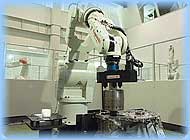 |
 |
| This
robot enables clutch assembly, something that had
been considered impossible in the past. Until now, the
experience of skilled workers had been irreplaceable in
the assembly of clutches as parts for automobile drive
transmission; these workers can now be replaced by robots.
This technology is attracting the attention of automobile
manufacturers from around the world. |
Kawasaki's
robot removes workpieces from the molding machine,
and performs all the work in the process, such as the
gate cut, assembly, and output. All the work is performed
precisely and speedily under full robot control with no
sequencers. |
|
| |
|
|

